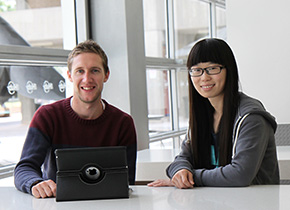Embedding student academic support
 Academic support for students is imperative for engagement with course material and effective learning. It should never be assumed that students know how to access academic information, who to ask for help, where to go for advice, or how to navigate technologies.
Academic support for students is imperative for engagement with course material and effective learning. It should never be assumed that students know how to access academic information, who to ask for help, where to go for advice, or how to navigate technologies.
When developing your course, consider the embedding of the following supports to assist students in achieving a quality learning experience. It is important to embed this information as part of your course design and development, regardless of delivery mode, to give students the maximum opportunity to succeed – not just as a service to direct them to if they are struggling.
Course support
Ensure students are aware of who the course coordinator is, and any other staff involved with teaching the course. This is particularly important for online courses where face-to-face introductions are not available. Students need to visualise who their tutors are either through images or a short introductory video, and have clear instructions on when and how they can contact tutors for questions and support.
Refer to the BOLD Learning and Teaching Practices: Focus Area 01 for a list of minimum course expectations.
Academic support
It should NOT be assumed that because students have gained entry to a tertiary course, that they have the skills to research academic databases, or write an academic paper. Students will come from a variety of education backgrounds and experiences, and therefore have a variety of literacy levels.
Regardless of where a student is along their tertiary journey, academic supports are paramount in enhancing student success. This makes embedding academic literacy support in the first year of any program essential, and intermittently throughout the remainder of their studies. Examples include:
- FedReady - Workshops and online materials to prepared students for university and academic study
- Peer Assisted Study Sessions [PASS] - Study sessions facilitated by experienced students
- ASK – Student leaders offering drop-in support on all academic study matters
- Online help with referencing - Online resources to support academic writing
- Course-based workshops to build academic skills for assessment tasks
- Study skills and writing guides - Online resources to support academic writing
- Studiosity – After hours online tutoring
- Library Services – Support with research skills and referencing
- Plagiarism – Resources to support student academic integrity
Student academic referrals
If you have identified a student in your course who is struggling with academic literacy or specific academic skills, you can refer them directly to a Learning Skills Adviser (LSA) for individual support.
Learning technology support
Students will have a varying array of literary skills when it comes to technology. It cannot be assumed that a particular generation, age or educational background will have a better or worse exposure to varying technologies used in education. Thus it is important that students are provided with opportunities to learn new skills and are provided with ample instructions and support for learning technologies – especially when attached to an assessment.
For online student technology support guides, please view the support topics within the Online Study Hub.
These support guides include the following topics:
- Edit your profile
- Using the dashboard
- Post to a forum
- Submit an assignment
- Unsubscribe from a forum
- Reduce emails from Moodle
- Virtual Classrooms
- Planning a video - Tips and Resources
- Upload Media to Kaltura
- Login to Mahara
- Update your Mahara profile
- Edit your Mahara profile page
- Navigate Mahara
Refer to the BOLD Learning and Teaching Practices: Focus Area 04 for a list of minimum course expectations.
International student support
International students come from all corners of the globe, and will be studying in Australia for a range of reasons. Regardless of what country they are from there are some common challenges that international students will face at some point or another:
- Shock of change
- Culture shock
- Language shock – Language challenges should not be mistaken for intellectual challenges.
- Academic shock – Academic challenges should not be mistaken for disregard for academic conventions.
There are a number of small accommodations teachers can undertake to support international students succeed in their studies.
For ideas on how to best support your international student academic needs, contact a Learning Skills Advisor.